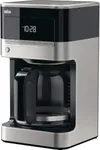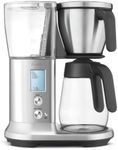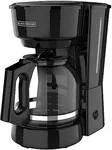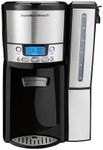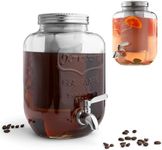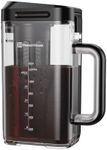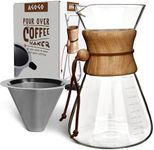Buying Guide for the Best Non Toxic Coffee Maker
Choosing a non-toxic coffee maker is a smart move for anyone who wants to enjoy their daily brew without worrying about harmful chemicals leaching into their drink. The main goal is to find a coffee maker made from safe materials and designed to avoid exposing your coffee to substances like BPA, phthalates, or unwanted metals. When shopping, it's important to look beyond just the brewing method and focus on the construction and materials used throughout the machine. Understanding the key specifications will help you make a choice that aligns with your health priorities and brewing preferences.Material SafetyMaterial safety refers to what the coffee maker is made from, especially the parts that come into contact with water and coffee. This is crucial because certain plastics and metals can leach chemicals or unwanted flavors into your drink. The safest options are usually glass, stainless steel, or ceramic, as these materials are non-reactive and free from harmful chemicals. When comparing coffee makers, look for those labeled as BPA-free or made entirely from stainless steel or glass. If you are sensitive to taste or want to avoid all plastics, choose a model with no plastic parts in the water reservoir or brewing path. Your choice should depend on how much you value chemical-free brewing versus convenience and design.
Heating Element TypeThe heating element is the part of the coffee maker that heats the water. Some heating elements are made from aluminum, while others use stainless steel. Aluminum can sometimes react with water, especially if the coffee maker is not well-made, potentially affecting taste and safety. Stainless steel heating elements are generally considered safer and more durable. If you are concerned about metal leaching or want the purest taste, look for coffee makers that specify a stainless steel heating element. This is especially important for people with sensitivities or those who want to avoid any risk of metal contamination.
Filter TypeThe filter in a coffee maker can be made from paper, metal mesh, or plastic. Paper filters are single-use and generally safe, but some people prefer reusable metal filters for environmental reasons. If you choose a reusable filter, make sure it is made from stainless steel rather than plastic or aluminum to avoid chemical exposure. For those who want to minimize waste and avoid toxins, a stainless steel mesh filter is a good choice. Your decision should be guided by how much you value convenience, environmental impact, and the desire to avoid any plastic contact.
Water Reservoir ConstructionThe water reservoir is where you pour water before brewing. Some reservoirs are made from plastic, while others use glass or stainless steel. Plastic reservoirs can sometimes leach chemicals, especially when exposed to heat. If you want to avoid this, look for coffee makers with glass or stainless steel reservoirs, or at least those labeled as BPA-free. If you are particularly concerned about chemical exposure, prioritize models with no plastic in the water path. This is especially relevant for people who brew coffee daily or leave water sitting in the reservoir for long periods.
Certifications and Safety LabelsCertifications and safety labels indicate that a coffee maker has been tested for harmful chemicals and meets certain safety standards. Look for labels such as BPA-free, FDA-approved materials, or third-party certifications for food safety. These labels provide extra assurance that the product is safe for daily use. If you want peace of mind and a guarantee of non-toxicity, prioritize coffee makers with clear safety certifications. This is particularly important for families, pregnant women, or anyone with health concerns.


